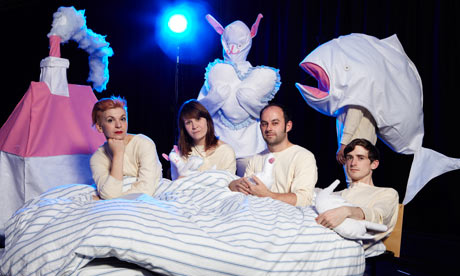27 June 2011
Duckie's Lullaby: a snoozefest
John O'Mahony: GuardianDreams have long been an inspiration in theatre, but this show actively induces sleep. Does it matter if you can't remember a thing?
http://www.guardian.co.uk/stage/theatreblog/2011/jun/27/duckie-s-lullaby-snoring-success-sleep
 Group sleepover ... Duckie's Lullaby at the Barbican. Photograph: Andy Hall
Group sleepover ... Duckie's Lullaby at the Barbican. Photograph: Andy Hall
It was perhaps inevitable – in a show specifically designed to send audiences to sleep – that the best part was always going to be the sense of dreamy anticipation. And so it is with Duckie's Lullaby, now playing at the Barbican Pit. Punters are instructed to turn up bearing a serviceable, stain-free pair of pyjamas or nightgown and slippers. On arrival at the theatre, an officious lady with an impressive beehive looks up "reservations" and then "checks in" any luggage – a process that felt strangely poised between hotel and airport.
After a soothing mug of hot chocolate (no Ovaltine, sadly), we were then led into the auditorium to take up our beds – singles, doubles, even triples for more open-minded folk. Before we all snuggled in for the show, the beehive lady set out the ground rules: "We want you to enjoy yourselves," she announced sternly, casting a steely glance at the giggling occupants of the triple beds, "But at the same time we would ask you to refrain from any erotic or illegal behaviour ..."
Lullaby is certainly not the first piece of performance to explore the boundaries between sleep and consciousness. Dreams have been lateral inspiration for many works, most notably Strindberg's Dream Play, which mirrors the lateral structure of the average nocturnal hallucination. Extended oneiric works by experimental directors such as Robert Wilson have often been so long – seven days in one case – that audiences could often only experience them through the haze of sleep and dream.
But Lullaby is perhaps the first in the history of theatre ever to actively induce the state: Duckie producer Simon Casson told me that the company isn't trying to engage or excite, just make people nod off. Even the music has been chosen with its soporific qualities in mind: composer and performer Matthew Robbins has written a score only using the white keys on the piano, on the basis that this is what musical boxes do, and thus that the effect will act mysteriously on the subconscious.
If anything, the show itself works far too well. Performers in oversized baby-grows prance around singing songs about rotating octopi or lull us with surreal adult bedtime stories. My original plan had been to write this blog actually during the show, scribbling away under the duvet with a torch, like a little boy illicitly reading comics after lights out. But even before the interval – during which brandy nightcaps were served – I was already dropping off, lulled by the over-articulated, children's telly anti-charm of the piece (as well as the unfeasibly soft and comfy mattresses). The last thing I remember was a shoal of huge, transparent tropical fish floating above the bed – though might that have been a dream?
In the morning, over a breakfast of boiled eggs and toast soldiers, everyone sat around in their pyjamas discussing their favourite moments: "I woke up in the middle of night," said one talkative gent, "And the whole theatre was snoring in unison, completely synchronised!" Curiously, nobody had anything whatsoever to say about the actual show – which they'd mostly dozed or slept through. Which, in its own terms, I guess makes Lullaby a resounding success. What happens on stage is by far the least interesting aspect. Instead, the piece offers a totally immersive experience, where you'll interact like never before with fellow audience members. And, into the bargain, you'll get one of the best nights of deep REM sleep you'll ever enjoy in a London theatre.
|



